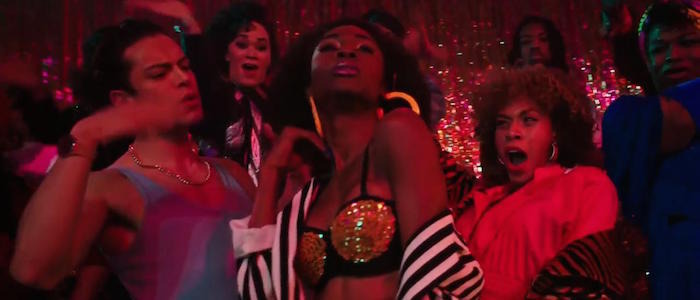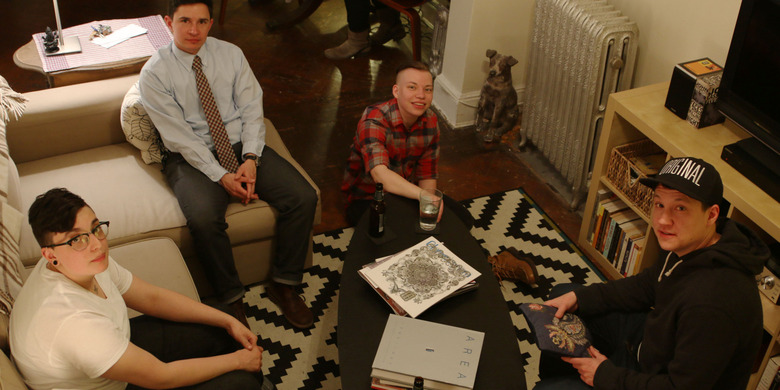The Scarlett Johansson Controversy Reveals Why Trans Artists Should Have Control Of Their Own Stories
Following the announcement that Scarlett Johansson would be taking on the role of transgender man Dante "Tex" Gill in the crime drama Rub and Tug, the actress was met with outrage. Did the actress think she wouldn't be met with opposition when the trans community learned of Gill's background? And how much longer will we have to have this conversation?
Why This Matters
Part of the reason why so many entertainment outlets initially got this story wrong goes back to original reporting in the Pittsburgh Post-Gazette. The original obituary referred to Gill as someone who "wanted to be known as Mr. Gill." To those of us in the transgender community, this was a major flag that Gill was a transgender male. But most movie news sites described Gill as a cross-dressing woman. It was Vulture associate editor Jordan Crucciola who became the first to point it out on Twitter. Looking at photos, there was nothing feminine about Gill. What started as a few trans and LGBTQ entertainment journalists tweeting about the role soon started to spread like a wildfire.
The source of the outrage was simple: Johansson is a cisgender actress taking potential roles away from trans actors who would be better suited to the role.
With a wildfire needing to be contained, Johansson had to say something. Her response was irresponsible, to say the least. Her reps provided a statement to Bustle in response to the backlash that at the very least, is a loaded sentence: "Tell them that they can be directed to Jeffrey Tambor, Jared Leto, and Felicity Huffman's reps for comment."
All three of those actors were nominated for or won awards for portraying transgender roles. Tambor and Leto won accolades for Transparent and Dallas Buyers Club, respectively. And regarding Huffman's role in Transamerica (for which she was nominated for an Oscar), trans actress Alexandra Billings originally had the role according to an interview with ScreenCrush, before being replaced with a cisgender actress.
So let's talk about why this matters. Assistant Professor of gender studies Cáel M. Keegan is a transgender media expert and has a written a book due out later this year on the works of filmmakers Lilly and Lana Wachowski. He sums it up quite well:
"We have never actually seen a mainstream or even independent, full-length scripted film with a trans male lead.One thing that really prevents strong pushback on things like Johansson playing this part is that we don't have competing examples to point to, of trans male representation done 'right,' except for a few marginal examples. The closest thing that exists is likely Cheryl Dunye's short film Black is Blue starring Kingston Faraday. Another is Elliot Fletcher's role on The Fosters, but these are not well-known or high budget studio projects. And the lack of creative projects at this level that include trans male talent leads to a feedback loop in which there are no perceived voices to seek out."
Keegan continues:
"The reasons for this lack are complex, but I do think the breakthrough success of [the film] Boys Don't Cry had a lot to do with legitimating the casting of cis bodies as trans. And the casting choices were, of course, influenced by coverage of Brandon Teena's death that pathologized his masculinity and read it as a result of sexual trauma — that he was "really a lesbian" who hated his "female" body. Donna Minkowitz has recently admitted she did great harm in breaking Brandon's story in this manner, but the effects have been taken up into Hollywood in these structural ways that are difficult to undo."
The truth is universal
"We have to stop hiring non-trans actors to play trans characters," Pose co-creator Steven Canals said on Twitter. "In my opinion, it's equally as traumatic and offensive as black-face. It also shows how lazy, unwoke, and complicit in transphobia you are."
That FX series is one of the best examples right now of allowing transgender talent the opportunity to portray transgender roles on television. By casting trans talent, the cast can pull from their own lived experiences. This is something that cisgender actors don't have the ability to do. Unfortunately, the same cannot be said about the movie industry. Change is coming slowly.
I spoke with several talented members of the transgender community for their thoughts in response to the casting, including actor Brian Michael of Queen Sugar and other series.
"I wouldn't necessarily say it's pressure, but I think it's necessary for us to tell our stories the whole time or at least be part of the storytelling," says Michael. "I feel like the shows and films that come out about people of trans experience [that] were written by people of trans experience, or starred people of trans experience had the most impact for trans audiences and cis audiences alike because they were rooted in such authenticity and truth. The truth is universal. It's going to resonate for anyone. If you're going to guess that from your best approximation from your imagination, you're going to miss out on something I think that's essential."
Many talented artists in the transgender community have to create their own opportunities.
"The responsibility lies with everyone, but we believe trans people are best positioned to create work on their own terms," says Lyle Kash, the writer and director of the upcoming Death and Bowling. "It's important for trans people to continue to pave the way by creating opportunities which might not otherwise exist. But we can't do it alone. Cisgender people in the film industry who are in a position to hire should follow the lead of trans film professionals. We must be in community and collaboration, using our strength in numbers. It is not enough to just cast trans actors. Trans people must be involved in all aspects of the filmmaking process; at the writer's table, in the producer's studio, behind the camera, and in front of the lens."
Outrage is exactly what the situation calls for
As Pride month was coming to an end, Chicago's Cinepocalypse gave us a rare treat. Transgender filmmakers graced the Music Box Theatre for two consecutive nights. One of most prominent transgender filmmakers in existence, Lana Wachowski, appeared for a Q&A and greeted fans after a screening of Bound. Speaking personally, having the chance to meet and talk with Lana is one of the highlights of my year. The next night, transgender filmmaker Nevi Lee Cline was there for a film she co-directed, The Secret Poppo. I spoke with Cline about the Scarlett Johansson controversy:
"When this happens, not only are the very few acting jobs available to trans people being taken away from us, it's also blatantly transphobic. If your idea of a trans man is Scarlett Johansson, that reveals that you think trans people's genders are somehow fake, that they are performances. That a trans man is really a woman. Every time a cis person is cast in a trans role of the opposite gender, it reinforces this idea to the audience, the idea that trans people are 'deceivers,' which is an idea that contributes to violence against trans people. Then when trans people speak up about the erasure and danger that comes with these casting decisions, everyone thinks their artistic freedoms are under attack and start warning of 'the authoritarian left.' It's the same with any trans issue — we ask for respect and people think we are coming for their free speech. You won't find a group of people more supportive of exploring gender through artistic expression than trans people. But this movie is not being made because Scarlett Johansson feels the need to explore her gender. This movie is being made because there once was a trans man who lived an interesting life. Yet apparently the casting directors think there are no trans men around to play the part. In an ideal world, any actor could play a role of any gender. But we do not live in an ideal world. We live in a world rampant with misconceptions about trans people, and seeing us portrayed by cis people contributes to that."
Emmett J. Lundberg, who created the critically acclaimed Brothers web series, also spoke to me:
"I'm over the excuses. When I was growing up, I didn't see myself or anyone like me on screen. I didn't even know that trans men existed. Now that we're at a point where there are folks who are able to be out and pursue their talents, I think outrage is exactly what the situation calls for. We are here. There are databases that list trans talent, there are groups, there's no reason not to actively cast and hire transgender people anymore. If you can't find us, you are not looking."
"I'm a trans man actor and I'm really upset about the recent casting of Scarlett Johansson in a trans masculine role," said Will Krisanda, who starred in Brothers. "It shows that Hollywood hasn't learned a thing. But it just gives trans filmmakers even more of a reason to create their own content because no one else is telling our stories in the way they should be told. These projects should be in the front lines, not something like Scar Jo's movie."
The Big Picture
Personally, I had hoped that things would have changed after the outrage that followed the film Anything, which premiered at the 2017 LA Film Festival. This film saw cis male actor Matt Bomer playing a transgender sex worker. At the same fest, there was another film starring trans actress Rachel Crowl as a trans woman: And Then There Was Eve. Can you guess which film was acquired for distribution? If you picked Anything, you're correct. The latter is still playing the festival circuit because distributors don't know what to do with it.
We had this conversation when Anything was announced. We had it again when Anything premiered at the 2017 LA Film Festival. We're having it again this summer. How many times do we need to have this conversation before studio executives, financiers, filmmakers, and actors start to understand the big picture?



